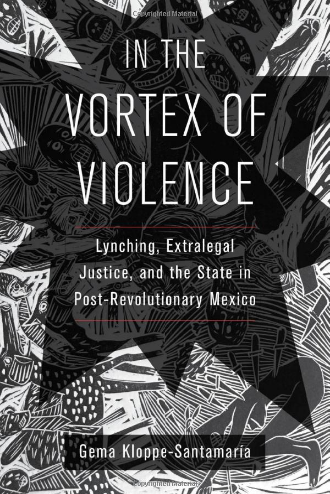In the Vortex of Violence: Lynching, Extralegal Justice, and the State in Post-Revolutionary Mexico
In the Vortex of Violence: Lynching, Extralegal Justice, and the State in Post-Revolutionary Mexico examines the uncharted history of mob violence in Mexico during the formative decades of the country’s post-revolutionary period. Based on the examination of hundreds of cases of mob violence, I explore the reasons behind the persistency of lynching during a period otherwise characterized by greater political stability and lower levels of violence. I argue that rather than signaling state absence, lynchings were triggered by the presence of state authorities that were perceived by communities as incapable or unwilling to provide the type of justice people deemed necessary to punish crimes and social transgressions. I further show that religion, witchcraft, and mythical beliefs played a central role in shaping people’s understanding of lynching as a legitimate form of justice.
The book adds historical depth to a scholarly literature that has construed lynching as a recent phenomenon linked to neoliberal modernization and incomplete processes of democratization. Built in dialogue with scholars working on violence, crime, and vigilante justice in Latin America and the United States, the book offers key insights into the cultural, political, and historical reasons behind the ongoing occurrence and legitimacy of lynching in Mexico and several other Latin American countries.
You can learn more about my book here; in this interview with the New Books Network; this conversation with New Books Network Español; this podcast with the Noria Mexico & Central American Program; and this interview with the podcast “Democracy in Danger” of the University of Virginia Media Lab.
Reviews of the book have appeared in:
Available at:
Reviews
“Conceptually cogent, profoundly researched, and persuasively written, In the Vortex of Violence appraises the political, cultural, and moral motivations behind lynching for community stakeholders. It draws readers near the pain of brutal violence and unearths its meanings for wider processes of state-making, exclusion, and domination in twentieth-century Mexico. An admirable achievement!”—Wil G. Pansters, Professor of Social and Political Anthropology of Latin America, Utrecht University
“Gema Kloppe-Santamaría’s study of lynching in Mexico is one of the best books I have read in recent years. In the Vortex of Violence is superbly researched and of great value to historians studying mob violence in all parts of the world. In recent years a number of scholars have studied late-twentieth-century extralegal violence in Latin America, but this book distinguishes itself by its attention to history and the enduring cultural underpinnings of collective violence. Its author is particularly deft at connecting lynching to state formation while not neglecting local attitudes toward religion and witchcraft. Most importantly, she understands the great significance of the discourse surrounding the alleged crimes at the heart of lynching cases. As a historian of the United States, I found this book constantly led me to rethink my own ideas and approaches. Anyone who has wrestled with the difficult question of how to distinguish lynching from murder should study In the Vortex of Violence.”—William D. Carrigan, coauthor of Forgotten Dead: Mob Violence against Mexicans in the United States, 1848–1928
“In the Vortex of Violence is an engaging and highly original foray into lynchings—a particular feature of violence that undergirds the relationship between civil society and state structures in Mexico. Gema Kloppe-Santamaría argues that we must center lynchings in our analysis of state formation to grasp the scale of impunity rampant in Mexico today. She expertly shows that the violence in contemporary Mexico has deep historical roots. The work is at once highly accessible and deeply sophisticated.”—Gladys McCormick, Associate Professor in History and the Jay and Debe Moskowitz Chair in Mexico-US Relations, Syracuse University


